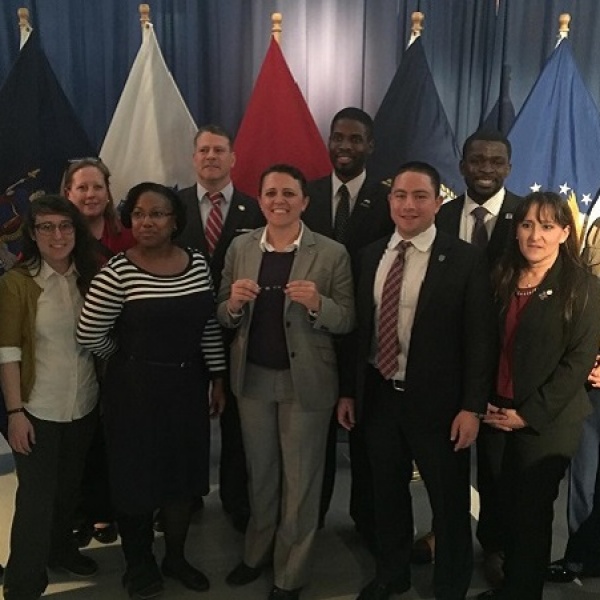
This blog post is adapted from a short address given by Kristen Rouse, one of four Civic Hall member-honorees, at our first year anniversary party February 1. Rouse is a three-term Afghanistan veteran who founded and runs the NYC Veterans Alliance. The other members honored for their accomplishments this past year are Chana Ewing of littlebigGirl + CO, Marek Banczyk of Cityglobe, and Erin Vilardi of VoteRunLead.
I joined Civic Hall last June when I heard about the Craigconnects scholarship for veterans. I had no income from any of my advocacy work, and I was overwhelmed with writing and editing the first ever in-depth report on NYC veterans policy. It was a lonely process that mostly involved me sitting by myself in pajamas in my tiny Brooklyn apartment, feeling isolated and like I might never see any of this through.
The Craigconnects veterans scholarship got me into Civic Hall, and Civic Hall got me out of my apartment and out of my pajamas, and interacting with a community that—even though most of you aren’t veterans—could definitely understand what I was going through.
A couple of years ago I was idly scanning through Google Zeitgeist, the search giant’s annual data release of each year’s top search trends. Somehow I found my way onto the international results, and picking almost at random I chose to look at the search terms for Germany.
There, sitting at the top of the pile, was something I could barely believe. The term in poll position was ‘Wahl-o-mat.’ Despite not being a German speaker, I recognized it: it was the brand name of a German website that helps people work out who to vote for.
Not a recently deceased TV star, or a major movie, or a massively viral YouTube video, but an old-fashioned, 36 question online quiz that ultimately spat out a suggested political party. Further searching revealed that it had been used, through to completion, over 13 million times in the 2013 national elections. Even more astonishing is the quiz is run by an arms-length public body—effectively a ‘who to vote for’ service delivered by part of the state.
Since then, I’ve been acutely aware that Germany has a social-impact technology scene that is somewhat unlike that of many other rich countries. So in January this year I set out on a trip to Berlin to find out about tech initiatives that might be a bit different from what you find elsewhere.